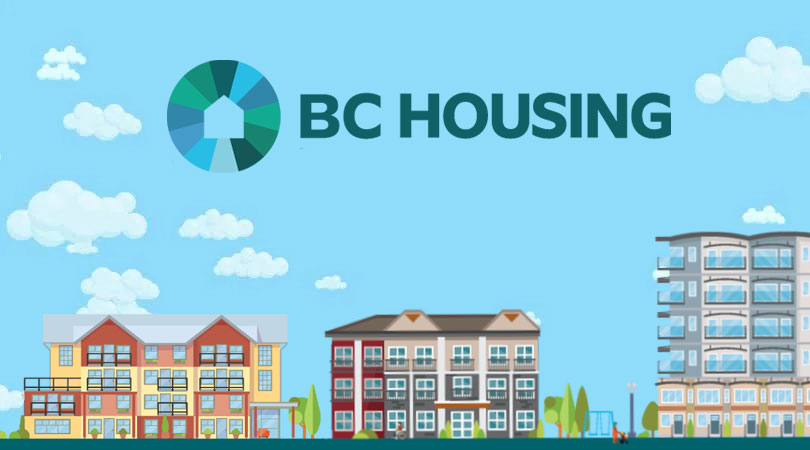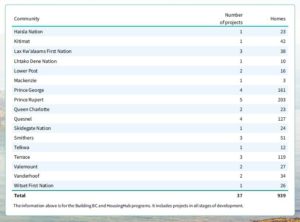In a Time of COVID: Building Thriving Communities
What does a thriving community mean to you? At BC Housing, it means a home for everyone, breaking down barriers to people fully participating in society, and working together on a shared commitment to equity, diversity, inclusion, belonging and reconciliation.
It became clear early on in the pandemic that people living outdoors or in a shelter were at higher risk – they could not safely distance. Finding spaces to self-isolate was one of the first steps taken by BC Housing as part of their COVID response.
In the northern region of BC, there are now 19 sites offering 161 spaces for people to safely distance. “At these 19 sites, we’re also coordinating daily meals for people. The pandemic has caused food security challenges,” explains BC Housing Operations Director Malachy Tohill. “In addition, as Northern Health recommends regular deep cleaning, we now have enhanced cleaning in BC Housing-managed buildings, and we partner with housing providers to have the same standard in their buildings. Cleaning and essential supplies like masks are an important way we’re helping to protect our social housing tenants.”
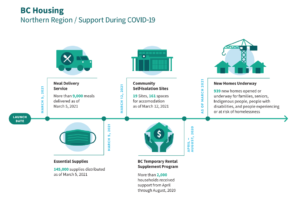
Renters in the private market also faced challenges, so the Province asked BC Housing to roll out the BC Temporary Rental Supplement Program, with more than 2,000 households across the north receiving support from April through August 2020.
Housing affordability and homelessness were already a challenge, but the pandemic has added a new pressure. “The impact of the housing crisis on our communities is wide ranging; it affects everything from recruitment and retention to putting a strain on our healthcare system to increasing costs for first responders,” says BC Housing Development Director Amy Wong. “We work hard to provide secure, affordable homes so that communities can thrive, something that has become more important than ever during these challenging times.” In the North, as of December 2020, there are 939 new homes funded by BC Housing Building BC programs and HousingHub that are underway for families, seniors, Indigenous people, people with disabilities, and people experiencing or at risk of homelessness. Learn more at: www.bchousing.org/publications/Affordable-Housing-Quarterly-Progress-Q1.pdf
A few examples include new homes with supports proposed for members of Lake Babine Nation, Ts’il Kaz Koh (Burns Lake Band), Skin Tyee Band, Cheslatta Carrier Nation, Wet’suwet’en First Nation and the Nee Tahi Buhn Band, as well as residents of the Village of Burns Lake; and a new senior and dementia care project underway in Vanderhoof; 19 new homes with supports in the Village of Queen Charlotte (Daajing Giids); and a number of new homes with supports in planning for Prince George.
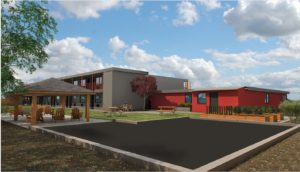
Building new housing meets a basic need for people in our communities, and it can also support the broader economy. There are direct opportunities for businesses to be part of new housing initiatives, through bidding on the development-related work on BC Bid, supply chain opportunities, or in leasing social enterprise space at BC Housing-owned buildings.
One funding program underway is the Supportive Housing Fund. Supportive housing is an apartment with supports provided on-site so that people can move forward with their lives. People report improvements in access to employment, income, education, addiction issues, mental health, and life skills.
Supportive housing also benefits taxpayers – the cost of providing supportive housing is less than the cost of providing the health and public safety services needed to address homelessness.

“During the planning phases of supportive housing projects, we often hear concerns about how this housing will impact an area. However, once the projects are complete and people housed, communities tell us they clearly see the benefits,” says Wong. “Research shows supportive housing does not negatively affect property values. It’s also a cost-effective solution, with every dollar invested in affordable rental and supportive housing creating between two and five dollars in social and economic value.”
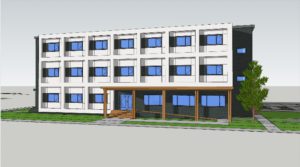
Supportive housing often uses modular construction, which is durable and cost-effective, and can be built quickly – within five to ten months. It can also be disassembled and reassembled, making it easy to relocate for reuse. BC Housing currently works with a range of modular housing providers, which generates economic activity and employment.
Another funding program underway is the Community Housing Fund (CHF.) It supports the creation of affordable rental housing for families, seniors, and low-income singles.
“This next phase of CHF will mean approximately 3,000 new affordable homes across the province. We invited non-profit and Indigenous housing societies, First Nations, housing co-ops and municipalities to propose new affordable housing projects,” says Wong. “Since the program was announced in 2018, we’ve already seen more than 5,000 new homes open.”
To create housing for middle-income earners, BC Housing works with the private sector through their HousingHub division. Working with non-profits and private developers, faith groups, property owners, federal and local governments and Indigenous partners, HousingHub creates new affordable rental and ownership housing by leveraging the commission’s borrowing facility to generate value for the public with no ongoing operating funding required.
“We know how tirelessly people are working on the frontlines – we want to thank everyone for their work and for caring for each other during this challenging time. The pandemic is not over yet, so we’ll continue to support the non-profit sector and our tenants,” says Tohill. “But we can’t lose sight of the long-term work needed to build stronger communities and build new partnerships so that everyone has a home.”
Learn more about BC Housing:
⦁ Community Stories: www.bchousing.org/news/community-stories
⦁ COVID Housing Sector updates: www.bchousing.org/COVID-19
⦁ Are you eligible for housing programs?: www.bchousing.org/housing-assistance/program-finder
⦁ Community Benefits of Supportive Housing: www.bchousing.org/research-centre/library/community-acceptance/community-benefits-supportive-housing
⦁ Engage on new projects in your region: www.letstalkhousingbc.ca/projects
⦁ Affordable Housing Quarterly Progress Report: www.bchousing.org/publications/Affordable-Housing-Quarterly-Progress-Q1.pdf

Website: www.bchousing.org
Facebook: www.facebook.com/bchousing.org




